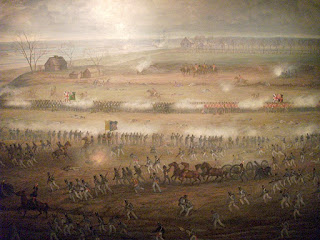So much is written about Admiral James Gambier, Lord of Iver, that it's more than a little superfluent to write about him here. He is, however an excellent ancestor of ours to mention, when inspired by the phrase 'witness to history'. You can read about him from Wikipedia if you wish to know more about his life at sea, on land, and in court- just click on the caption to find the link.
 |
| Lord Gambier, Admiral of the Fleet |
But the event that he witnessed, which I want to focus on, is a part he played in ending a war that every Ontarian school child from Grade 7 and up will know about; The War of 1812. Anyone who has visited Upper Canada Village will know something about the War of 1812, and how the people of what is now Canada, were impacted by the defence of the British Empire, against the USA. Some referred to the war as the second Revolutionary War.
 |
| The Battle of Chrysler's Farm, by Adam Sheriff Scott |
A team of notable American dignitaries, led by John Quincy Adams, joined Gambier and his crew in Ghent (now part of Belgium), a neutral country. They hashed out an agreement and it was signed in August 1814. On the document where you can see all the signatures, each accompanied by a red seal, you can see Gambier's monicker right at the top.
 | |
| Click here to see the document from the USA's National Archives |
The war did not end immediately. The treaty had to first be ratified by each country's governments, so the war did not officially end until February 1815, by which time The White House had been burned by invading British Troops.
 |
| The White House was burned on August 24th, 1812, shortly after peace negotiations had started. |
After the war was over, everything returned to as it had been before. Nothing had been gained by either side, and nothing had been lost, except for the lives of those who had fought for apparently nothing.
Admiral James Gambier, Lord of Iver, was my 4x great granduncle, on my maternal grandfather's side of the family. At the end of his life he was living in Iver Grove, Buckinghamshire, where with the help of his gardener William Thompson he cultivated 'heartsease' which are the plants known today as pansies. He died in 1833, at Iver, with no heirs (despite all the nephews and nieces he had from his extensive list of siblings.)
After his passing the house fell into disrepair. The grounds were used in WWII to help house Polish refugees, but it wasn't until 1957 that the Ministry of Works acquired the property and restored it. Later the play and screenwriter Tom Stoppard lived there with his wife, and it was up for sale again, more recently in 2007. It seems like it was proving difficult to sell, and I've not been able to ascertain whether its still on the market or not. Anyone got a cool few million to spare?





No comments:
Post a Comment